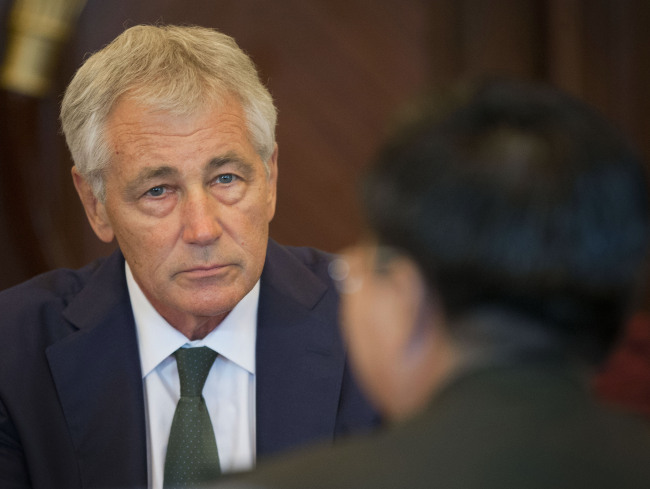China hits back at U.S., Japan for ‘provocative’ remarks
By Korea HeraldPublished : June 1, 2014 - 20:42
SINGAPORE (AFP) ― China strongly denounced Japanese Prime Minister Shinzo Abe and United States Defense Secretary Chuck Hagel Sunday for “provocative” remarks accusing Beijing of destabilizing actions in contested regional waters.
Lt. Gen. Wang Guanzhong, deputy chief of the general staff of the People’s Liberation Army, told an Asian security forum in Singapore that the comments had been “unacceptable.”
Abe opened the Shangri-La Dialogue on Friday by urging countries to respect the rule of law ― an apparent reference to perceived Chinese aggression over disputed islets in the South and East China seas.
Hagel followed on Saturday by warning China against “destabilizing actions” in the South China Sea and listed a number of alleged infractions, including against the Philippines and Vietnam.
Lt. Gen. Wang Guanzhong, deputy chief of the general staff of the People’s Liberation Army, told an Asian security forum in Singapore that the comments had been “unacceptable.”
Abe opened the Shangri-La Dialogue on Friday by urging countries to respect the rule of law ― an apparent reference to perceived Chinese aggression over disputed islets in the South and East China seas.
Hagel followed on Saturday by warning China against “destabilizing actions” in the South China Sea and listed a number of alleged infractions, including against the Philippines and Vietnam.

“The Chinese delegation... have this feeling that the speeches of Mr. Abe and Mr. Hagel are a provocative action against China,” said Wang, dressed in full military regalia.
He cast aside his prepared speech and said he needed to respond to the remarks, accusing Abe and Hagel of “coordinating” with each other to attack China at the conference.
“This is simply unimaginable,” said Wang, the highest ranking military official in the Chinese delegation, adding that the speeches were “unacceptable and not in the spirit of this Shangri-La Dialogue.”
“The speeches made by Mr Abe and Mr Hagel gave me the impression that they coordinated with each other, they supported each other, they encouraged each other and they took the advantage of speaking first ... and staged provocative actions and challenges against China,” he said.
Stressing U.S. commitments to allies and friends in Asia, Hagel had called for a peaceful resolution of maritime disputes and issued a blunt message to Bejing.
“In recent months, China has undertaken destabilizing, unilateral actions asserting its claims in the South China Sea,” the Pentagon chief said.
He accused China of restricting the Philippines’ access to Scarborough Shoal, putting pressure on Manila’s long-standing presence in Second Thomas Shoal, beginning land reclamation at various locations and moving an oil rig into disputed waters with Vietnam.
Hagel said that while the United States does not take sides on rival claims, “we firmly oppose any nation’s use of intimidation, coercion, or the threat of force to assert these claims.”
“The United States will not look the other way when fundamental principles of the international order are being challenged,” he warned.
Abe pledged that his country would play a larger role in promoting peace in Asia, as his administration moves to reshape the Japanese military’s purely defensive stance.
Laying out a vision of Tokyo as a counterweight to the growing might of China but without naming any country, Abe offered Japan’s help to regional allies “to ensure security of the seas and skies.”
He said Japan and the U.S. stood ready to bolster security cooperation with the Association of Southeast Asian Nations to promote peace.
“Japan intends to play an even greater and more proactive role than it has until now in making peace in Asia and the world something more certain,” Abe said.
China is locked in heated disputes with various Southeast Asian countries over waters and territories in the South China Sea.
Beijing and Tokyo also contest islands in the East China Sea.
Wang said he preferred Hagel’s directness by directly naming China, compared to Abe who did not mention any country.
“If I am to compare the attitude of the two leaders, I would prefer the attitude of Mr. Hagel. It is better to be more direct,” he said.
“He (Abe) may name the (country) or not but all the audience know that he was targeting China.”
-
Articles by Korea Herald








![[KH Explains] Hyundai's full hybrid edge to pay off amid slow transition to pure EVs](http://res.heraldm.com/phpwas/restmb_idxmake.php?idx=644&simg=/content/image/2024/04/18/20240418050645_0.jpg&u=20240419100350)







![[From the Scene] Monks, Buddhists hail return of remains of Buddhas](http://res.heraldm.com/phpwas/restmb_idxmake.php?idx=652&simg=/content/image/2024/04/19/20240419050617_0.jpg&u=20240419175937)

![[KH Explains] Hyundai's full hybrid edge to pay off amid slow transition to pure EVs](http://res.heraldm.com/phpwas/restmb_idxmake.php?idx=652&simg=/content/image/2024/04/18/20240418050645_0.jpg&u=20240419100350)

![[Today’s K-pop] Illit drops debut single remix](http://res.heraldm.com/phpwas/restmb_idxmake.php?idx=642&simg=/content/image/2024/04/19/20240419050612_0.jpg&u=)